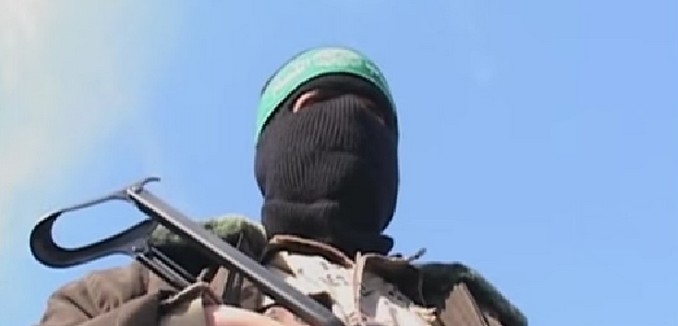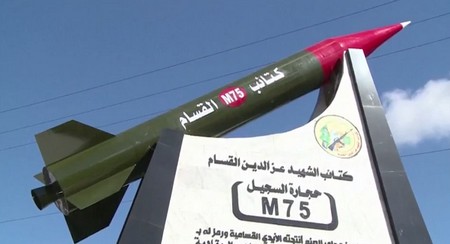Yesterday the Palestinian Authority announced the formation of a unity government together with the terrorist organization Hamas. Though State Department spokesperson Jen Psaki announced that the U.S. would “work with” the new regime, Israeli officials as well as an array of U.S. lawmakers are deeply skeptical that doing so would be possible—or even legal. Here are a few reasons why.
(1) Hamas is globally classified as a terrorist organization.
Hamas is classified as a terrorist organization by Canada.
Hamas is classified as a terrorist organization by the European Union.
Hamas is classified as a terrorist organization by the United States.
Hamas’s Izz al-Din al-Qassam Brigades is classified as a terrorist organization by Australia.
(2) It is illegal to aid Hamas under American law.
According to the 2012 Consolidated Appropriations Act:
(f) Prohibition to Hamas and the Palestine Liberation Organization-
(1) None of the funds appropriated in titles III through VI of this Act may be obligated for salaries of personnel of the Palestinian Authority located in Gaza or may be obligated or expended for assistance to Hamas or any entity effectively controlled by Hamas, any power-sharing government of which Hamas is a member, or that results from an agreement with Hamas and over which Hamas exercises undue influence.
An exception can be made if the President certifies that the government “publicly acknowledged the Jewish state of Israel’s right to exist,” commits itself to observing all previous agreements with Israel, and that the Palestinian government is committed to, among other things, “dismantling all terrorist infrastructure.” The current Palestinian unity agreement allows for Hamas to keep its weapons.
(3) American lawmakers on both sides of the aisle oppose working with a Palestinian government that includes Hamas, and are now moving to cut aid to the PA.
The Associated Press reported yesterday, “Rep. Kay Granger, R-Texas, who chairs a House Appropriations subcommittee on U.S. foreign operations, said Palestinian aid was now ‘off the table.’ The panel’s top Democrat, Rep. Nita Lowey of New York, was almost as strong, saying the deal puts funding ‘in jeopardy.'”
Reuters reported that Rep. Eliott Engel, (D-NY) the top Democrat on the House Foreign Affairs Committee, said, “The United States is under no obligation to give a dime to the PA as it reconciles with a known terrorist group.”
Rep. Ted Deutch (D-FL) released a statement: “Hamas is a designated terrorist group that has consistently refused to accept the international Quartet conditions of recognizing Israel, renouncing violence, and accepting all previous negotiated diplomatic agreements. … Unfortunately, this decision to unite with Hamas only further diminishes the prospects for peace.”
Rep. Ileana Ros-Lehtinen (R-FL) also issued a statement: “This contortionist act, akin to an embarrassingly evil Cirque du Soleil trick without any of the charm, is disingenuous at best, but this is the type of scheme you would expect from Abu Mazen and his cronies as they continue to try to undermine the peace process and fail to live up to past agreements with Israel. … The Administration must not fall for Abu Mazen’s latest ploy and instead enforce U.S. law and cut off funding.”
Rep. Ed Royce (R-CA) was quoted by the Associated Press saying, “While the ‘unity government’ hides behind the facade of nonpartisan bureaucrats, it was only born out of support from Hamas – a terrorist organization that continues to call for Israel’s annihilation.”
Senators Mark Kirk (R-IL) and Marco Rubio (R-FL) issued a joint statement: “Israel has gone to great lengths in recent months to negotiate in good faith with the Palestinian Authority, but President Abbas’ announcement earlier today of a Hamas-backed Palestinian transitional government makes clear once again that Israel does not have a viable partner for peace.”
In April, when word of the unity agreement was first reported, Deputy National Security Adviser Tony Blinken said that the administration would support the cutoff of aid to the Palestinian Authority if it brought an unreformed Hamas into the government. The Jerusalem Post reported:
In an interview with CNN’s Candy Crowley, Tony Blinken, assistant to US President Barack Obama and a deputy national security adviser, said that the White House is ready to participate in such a suspension, should Congress move forward with a freeze. …
Asked whether the White House is prepared to work with Congress to suspend the aid should Hamas fail to adhere to those principles, Blinken said, “If a government didn’t do that, yes.”
(4) Hamas forms one of the largest armed forces in the region.
The obligations of the Palestinian Authority include “dismantling all terrorist infrastructure, confiscating unauthorized weapons, arresting and bringing terrorists to justice, destroying unauthorized arms factories, thwarting and preempting terrorist attacks…” Yet the unity agreement leaves Hamas (and other smaller terror groups) in charge of their armies and weapons. The Jerusalem Post reported yesterday that Hamas “forms one of the largest armed forces in the region.” According to Defense Minister Moshe Ya’alon, Hamas has an arsenal of 10,000 rockets. Hamas is also reported to have an army of 15,000 fighters. Palestinian Islamic Jihad (PIJ), also based in Gaza, has 2,000 rockets and 5,000 fighters. The unity agreement doesn’t bring Hamas, PIJ or any of the the other smaller Gaza-based terror groups under the control of the PA.
(5) Hamas manufactures its own weapons, including a rocket that can threaten Tel Aviv.
According to the Jerusalem Post story cited above, Hamas has the ability to manufacture its own rockets, including the M75, which has the range to reach Tel Aviv.
(Photo: Screenshot from MinWashingtonNews)
(6) Like Hezbollah, Hamas is a client of Iran.
After a break of two years due to Hamas’s support of the Syrian rebels opposed to the regime of Bashar al-Assad, Iran and Hamas announced that they have resumed relations earlier this year. In March, Hamas leader Mahmoud al-Zahar announced to Iran’s Fars news agency, “The Hamas movement and Iran have taken special measures and we will see many changes in these relations soon.” At the end of May, representatives of Hamas and Iran met for the first time in three years. At the meeting between Khaled Meshaal of Hamas and Iranian Deputy Foreign Minister Hossein Amir-Abdollahian, Meshaal “praised Iranian support for the ‘axis of resistance.'” In a reference to its sponsorship of Hezbollah, a top Iranian offical recently said, “our strategic depth has now stretched to the Mediterranean coasts and just to the north of Israel.”
(7) Hamas says that the agreement means that the PA will end security cooperation with Israel.
The Times of Israel late last week quoted Hamas leader Moussa Abu Marzouk as saying “that Hamas had reached no understanding with Fatah regarding the issue of security cooperation with Israel, and that the Islamist movement would not allow it to continue.” Another Hamas official was quoted saying “that Hamas would not abandon the path of ‘resistance,’ or violence against Israel — a path the Islamist group shares with the Lebanese Shi’ite terrorist organization Hezbollah.” In reaction to the news report, The Tower observed yesterday, “These commitments to resistance and ending security coordination with Israel, which are fully aligned with Hamas’ charter, came just a couple of days after Abbas described the joint security work with Israel as ‘sacred.'”
(8) Hamas seeks to follow the “Hezbollah model.”
Two weeks ago, Haaretz cited a Hamas official describing the terror group’s plan for the unity government: “The model being planned for the new Palestinian unity government is that of Hezbollah in Lebanon, in which the organization is a government party that has shed responsibility for routine matters but maintains an independent military.” Writing for The Tower, Omri Ceren elaborated on that model: “Permitting Hamas to maintain the equivalent of a heavily armed state-within-a-state – mirroring the situation that Hezbollah has established in Lebanon – would enable the organization to block the consolidation of political power under a central Palestinian government, while still leaving Ramallah both politically and legally responsible for any Hamas provocations.” Hezbollah’s interference has made it impossible for Lebanon to choose a new president and form a new government.
(9) Hamas is viewed as nearly as corrupt as Fatah.
While Hamas came to power in the 2006 Palestinian legislative elections partially due to its reputation for transparency and honesty, it is now viewed nearly as corrupt as Fatah. A poll taken in September 2013 (.pdf) shows that 79% of Palestinians view Fatah as corrupt and 66% view Hamas as corrupt.
(10) Two-thirds of Americans oppose holding peace talks with the Hamas-Abbas regime.
In May, The Israel Project published a poll showing overwhelming support for Israel’s position among American’s polled. Specifically, two-thirds of those polled agreed that Israel “cannot be expected to negotiate with a government or party that does not recognize its right to exist and seeks to destroy it.”
(11) Hamas is unrepentantly genocidal in its ideology, and is constitutionally committed to destroying Israel.
After quoting Muslim Brotherhood founder Hassan al-Banna in its introduction, “Israel will exist and will continue to exist until Islam will obliterate it …” the Hamas Charter spells out in article 6:
The Islamic Resistance Movement is a distinguished Palestinian movement, whose allegiance is to Allah, and whose way of life is Islam. It strives to raise the banner of Allah over every inch of Palestine, for under the wing of Islam followers of all religions can coexist in security and safety where their lives, possessions and rights are concerned. In the absence of Islam, strife will be rife, oppression spreads, evil prevails and schisms and wars will break out.
In article 27, after praising the PLO as “closest to the heart of the Islamic Resistance Movement” the charter warns, “we are unable to exchange the present or future Islamic Palestine with the secular idea. The Islamic nature of Palestine is part of our religion and whoever takes his religion lightly is a loser.”
Please read 10 Things You Need to Know About Hamas.
[Source: Kanal von documentaries4jew / YouTube ]





